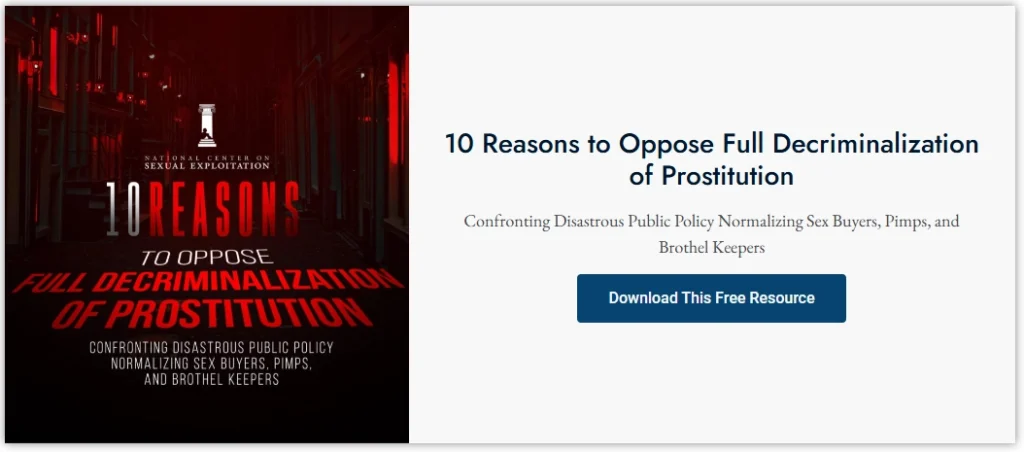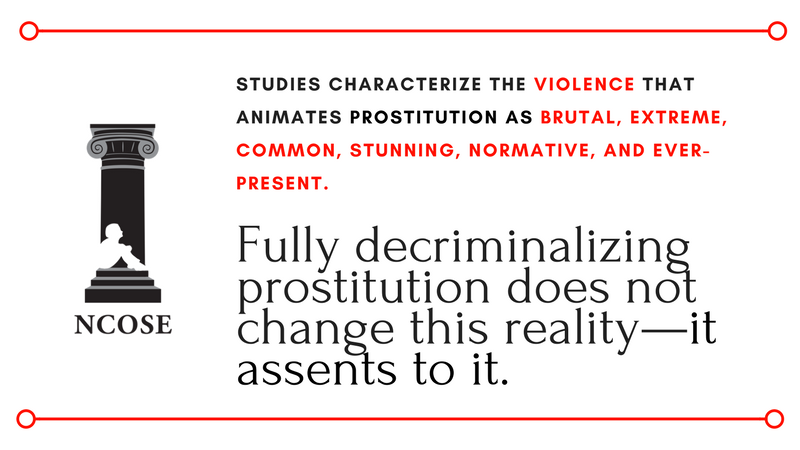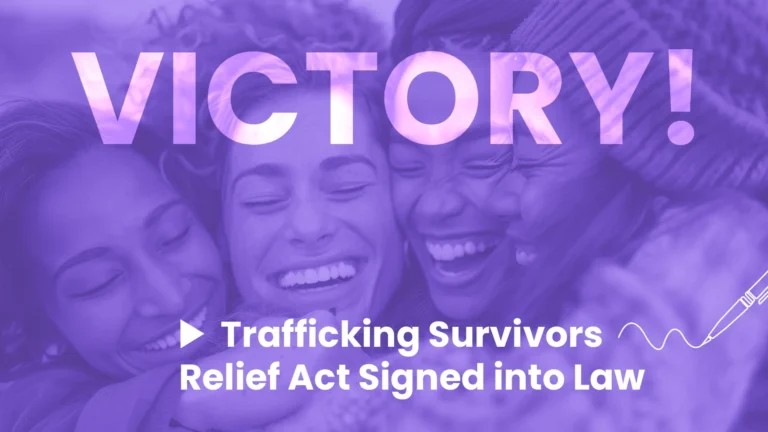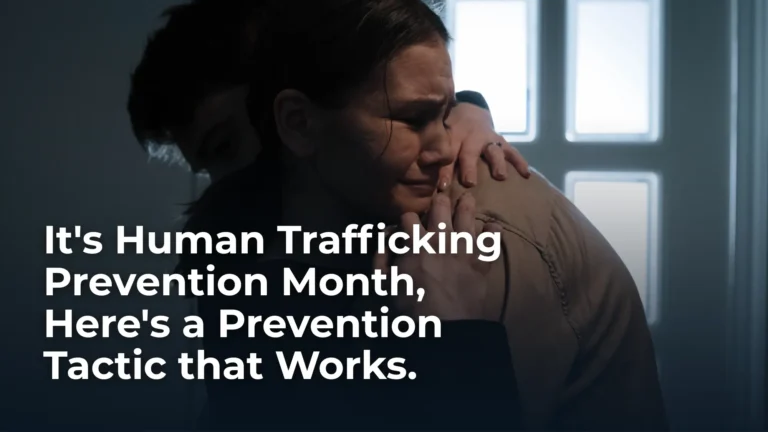This blog is part of a series: “Reality Check: Exposing Myths from the Pro-Prostitution Lobby” Read the other blogs in this series:
- No, Prostitution is Not the Same as Being an Athlete or a Secretary
- 5 Things Sex Buyers Reveal About Prostitution
Hospitalized by food that was served to her.
Forced to engage in sex acts in 24-hour shifts with no breaks.
Weapons often brought in by “customers.”
Denied her necessary medications.
These are some of the heinous conditions experienced by Jane Doe in one of Nevada’s legal and “reputable” brothels.
She was forced to live at the brothel, but was charged an exorbitant amount of money to stay there. The brothel was surrounded by a barbed wire fence and a gate, for which she had no key. She was not allowed to leave, or even go outside into the locked yard without asking permission. Half of her earnings were snatched from her by her bosses and they charged her astronomical fees for ludicrous things, like using too many towels.
Because of the preposterous fees imposed by the brothel owners, Jane found herself in debt bondage to them. She was forced to live in an unconscionable environment in order to pay off an ever-mounting debt.
Now, Jane Doe and the NCOSE Law Center have filed a lawsuit against the brothel owners, as well as Nevada government officials for its legalization of prostitution, which allowed the treatment by her bosses to be swept under the rug.
Jane Doe is one of countless victims who has been sexually exploited in legal brothels. And it isn’t just happening in Nevada—it’s happening all around the world.
***
There has long been controversy over the legalization and full decriminalization of prostitution. One of the key arguments in favor of legalization or full decriminalization is the notion that because prostitution will occur anyway, legalizing or decriminalizing will presumably make it safer for women and prostituted persons. But let’s examine that claim.
Does Jane’s account of her life in a legal brothel sound like the legalization of prostitution has made the practice safer?
In this article, we will offer a rebuttal to common arguments and myths frequently posited by the pro-prostitution (i.e. pro-organized sexual exploitation) lobby.

Myth 1: Legalization or full decriminalization is necessary for prostituted persons to feel safe reporting violence to police.
It is true that if prostituted persons are criminalized, they will fear reporting violence to the police. However, it is not true that the only way to address this issue is to legalize or fully decriminalize the sex trade as a whole.
NCOSE does not advocate for the criminalization of prostituted persons. Rather, we advocate for the criminalization of the exploiters (i.e. sex buyers, pimps, and brothel keepers) while supporting and providing exit services to those who are exploited (i.e. prostituted persons). This legal approach is described with various names, including the Survivor Model, the Abolition Model, the Nordic Model, and the Equality Model. Under this model, prostituted persons need not fear arrest if they report violence to the police.
In order to dismantle the prostitution marketplace, we must target the ones who are keeping it afloat: sex buyers. If we can deter potential sex buyers, then the demand for prostitution is reduced without penalizing victims of prostitution themselves.
Adopting the Survivor Model would also correct the gender bias within this issue because instead of prostituted persons (who are primarily women) being penalized, the sex buyers (primarily men) would be the ones who are held accountable for this illegal activity.
Myth 2: Legal recognition of prostitution as a profession maximizes prostituted persons’ equality and dignity.
Legalizing or fully decriminalizing prostitution does not cause sex buyers to have more respect for prostituted women. German feminist Elly Arrow did extensive research on the effects of legalized prostitution, collecting quotes from sex buyers in Germany, Austria, and Switzerland as case studies, since prostitution is legal in all of these countries.
These quotes reveal the astonishing misogyny and lack of respect that even “legal” prostituted women are subjected to.
**TRIGGER WARNING: The following content contains graphic depictions of sexual abuse and may be upsetting for some readers. Words in brackets have been changed out of sensitivity to our readers.**
“Is a wh*re just a piece of f**k-meat or does one have to show respect? … To me a wh*re is just a thing, that’s there to satisfy me. I do my part by paying.”
“I booked this animal once. Her apartment stinks of cat piss and the bed was broken …. She wasn’t shaven– even though I demanded that.”
“Looking for a lady who will let me sh*t and puke on her – slim, cause I don’t like fatsos.”
“When Alyssa (pseudonym) was still being shared around, it took effort to convince her to put the rubber back in her purse. Anal wasn’t easy either. I had specifically been assured that Alyssa would offer up her [anus], but she didn’t know she had to. The [anal sex] hurt her a lot, but with the necessary bit of pressure, I was able to take her hardcore-style.”
See the full collection of quotes here.
Whether prostitution is legalized, fully decriminalized, or not, one thing remains consistent: sex buyers do not see prostituted women as people, but as objects.
@endexploitation Jimmy Carter wrote about the dangers posed by decriminalization of prostitution in a 2016 article in the Washington Post. THERE IS A BETTER WAY #JimmyCarter #DecriminalizationOfProstitution #EndExploitation #protectwomen #NCOSE #BetterWay ♬ original sound – NCOSE
Myth 3: If prostitution is criminalized, prostituted persons must deal with more dangerous men.
It is often argued that, even if the prostituted persons themselves are not criminalized, criminalizing pimping and sex buying still endangers them, because it means they must deal with more dangerous men—i.e. every man they interact with is someone who is willing to commit a criminal offense. While this intuition is understandable, evidence does not suggest that legalizing or fully decriminalizing prostitution turns sex buyers and pimps into safe, nice guys.
In countries where prostitution has been legalized or fully decriminalized, data shows that prostituted persons still face high levels of violence and exploitation from both pimps and sex buyers.
For example, a 2021 review of New Zealand’s full decriminalization law concluded that “violence is a risk every [prostituted person] takes on a daily basis: assault, rape and strangulation are not uncommon.” In India, where prostitution is legal, a study of 211 prostituted women in Mumbai found that 62% reported sexual assault from male clients during the initial month after entry and 42% had been forced or coerced into the sex trade. Half of respondents were exploited before the age of 18.
Research also suggests that the legalization of prostitution leads to higher incidence of sex trafficking. An analysis of data from 150 countries found that nations where prostitution is legalized reported higher inflows of human trafficking than in countries where it was partially or fully prohibited.
Violence against women is widespread across many aspects of life and any situation that requires a woman to spend time alone with a man she does not know poses a risk of physical violence that makes it innately dangerous. Furthermore, the power structure that exists between the sex buyer (in some cases powerful men) and the prostituted person (who is frequently stigmatized as “disposable” or low status in society) serves as an enabler for violence. The buyer may feel entitled to commit violence against a prostituted woman if he feels the “services” he paid for were not “satisfactory” (i.e. if she does not agree to certain sexual acts he requests), especially if the buyer has power in society.

Myth 4: Legalization or full decriminalization will minimize health risks to prostituted persons
It is commonly argued that legalizing or fully decriminalizing prostitution will reduce health risks to prostituted persons, such as contraction of STIs. However, research still finds health risks to be rampant in legalized or fully decriminalized countries.
For example, in Germany, a study on sexual behavior in the country found that sex buyers are also more likely to endanger their sexual partners by failing to use condoms, despite laws that make condom use mandatory in prostitution. Thirty-sex percent of sex buyers identified in the study reported not using condoms with their primary partner and half of sex buyers reported unprotected sex between themselves and the prostituted person(s). Sex buyers are not only endangering prostituted persons by failing to use condoms, but also in some cases, their primary partner, if they do not use condoms while having multiple partners.
Research conducted on the health, well-being, and safety of women in Germany found that prostituted women experience much higher rates of gynecological issues, digestive complaints, and eating disorders. About half of those interviewed in this study showed symptoms of depression, with a quarter citing “frequent or occasional” thoughts of suicide. A third experienced anxiety or panic attacks and approximately one in seven had the intention to self-harm within the past year. Prostituted women were also more likely to use drugs.
Myth 5: Legalizing or fully decriminalizing prostitution is necessary to provide income to vulnerable populations
Some will argue that prostitution is necessary because it provides income for poor and marginalized populations, and that we should therefore legalize or fully decriminalize the practice. This view turns prostitution into a faux social security system that requires the sexual exploitation of poor and minority individuals, and especially women since the vast majority of people in prostitution are women.
This is regressive, misogynistic, and dystopian. Governments should never reduce economically insecure people to a state of sexual servitude because they are poor.
In fact, those who are lower income, impoverished, or part of marginalized groups are extremely vulnerable to being victimized in sex trafficking. For example, in a study among 215 homeless young adults aged 18 to 25, more than one-third of the sample reported being sex trafficked. Further, a research report by the Urban Institute explained that societal rejection, economic instability, and homelessness often drive LGBTQ+ youth to trade sexual access to their own bodies in exchange for basic needs like shelter. In King County, Washington, data collected between 2011 and 2020 found that Black children made up 43% of minors who were sex trafficked, despite only making up 6.3% of the population in in this area at that time.
These are only a few examples of the vast body of research which demonstrates how pimps and sex traffickers prey on vulnerable populations. Legalizing or fully decriminalizing prostitution only exacerbates this problem because it increases the demand for paid sex, which further incentivizes pimps/sex traffickers to find victims to meet that demand.
Do we really think it is appropriate to normalize the abuse experienced by prostituted people because governments do not prioritize economic security for vulnerable populations?
In light of the foregoing evidence, it’s clear that legalizing or fully decriminalizing prostitution only builds on ramps to more sexual exploitation by fueling demand. Instead, we need to adopt the Survivor Model, which will decriminalize survivors of prostitution and sex trafficking and increase penalties for exploiters. We must not whitewash or sanitize the brutal reality of prostitution. Continuing to try and legitimize prostitution only legitimizes one thing: male sexual entitlement.



